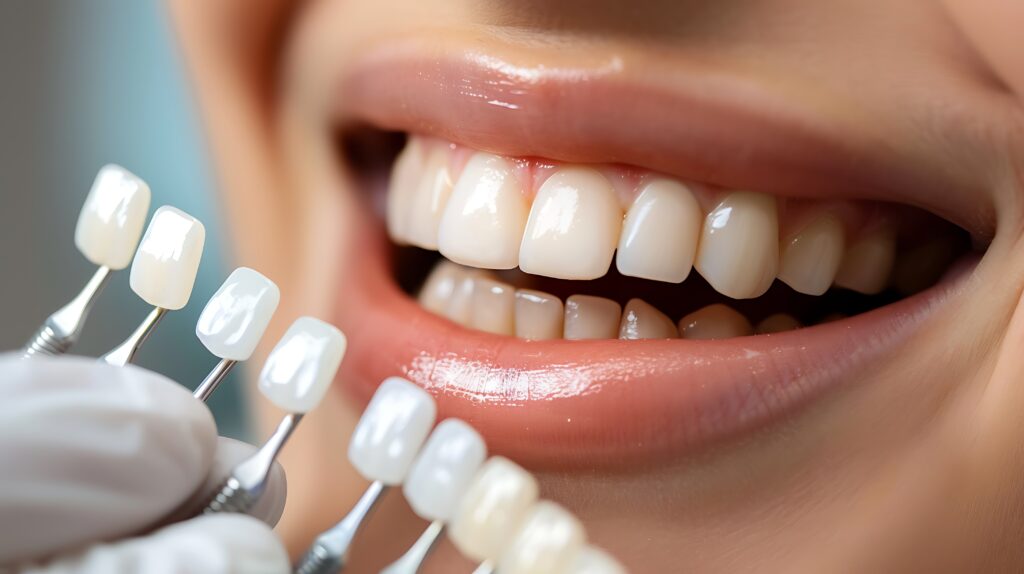Your smile is one of the first things people notice about you. If you’re considering veneers to enhance your teeth, you’re likely asking: Is it worth the investment? Veneers can transform your appearance, but they come with a price tag that makes them a major decision. Here’s everything you need to know about their cost, benefits, and whether they’re the right choice for you.
What Are Veneers?
Veneers are thin shells, typically made of porcelain or composite resin, designed to cover the front surface of your teeth. They’re custom-made to match your natural tooth shape and color, providing a flawless appearance.
Common Reasons for Veneers:
- Stubborn stains or discoloration
- Chipped or broken teeth
- Minor alignment issues
- Gaps between teeth
- Unevenly sized or shaped teeth
Porcelain veneers are known for their durability and natural look, while composite veneers are more affordable but less resistant to stains and damage.
The Cost of Veneers: What to Expect
The cost of veneers depends on several factors, including the material, location, and the expertise of your dentist.
Average Costs:
- Porcelain Veneers: $800–$2,500 per tooth
- Composite Veneers: $250–$1,500 per tooth
While porcelain veneers have a higher upfront cost, their durability (lasting 10–15 years) often makes them a more cost-effective option over time. Composite veneers are less expensive but typically last only 5–7 years.
Factors Affecting Veneer Costs
- Material: Porcelain is more expensive due to its durability and natural appearance. Composite resin is cheaper but may require more frequent replacements.
- Number of Teeth: Covering multiple teeth increases the total cost significantly.
- Location: Prices vary based on your geographical area and the dentist’s expertise. Urban areas tend to have higher costs.
- Additional Procedures: Preparatory treatments like teeth cleaning or reshaping gums can add to the expense.
Are Veneers Worth the Investment?
The answer depends on your goals, budget, and commitment to maintaining your new smile. Let’s weigh the pros and cons.
Benefits of Veneers:
- Aesthetic Improvement: Veneers can give you a brighter, straighter, and more symmetrical smile.
- Durability: Porcelain veneers resist stains and chips, making them a long-lasting solution.
- Confidence Boost: A beautiful smile can enhance your self-esteem and improve social interactions.
Drawbacks of Veneers:
- Cost: The initial expense can be high, especially if multiple veneers are needed.
- Permanence: Veneers involve removing some enamel, making the procedure irreversible.
- Maintenance Needs: They require care to avoid chips, cracks, or staining, especially with composite options.
Alternatives to Veneers
If veneers seem too costly or invasive, there are other cosmetic dentistry options to consider:
- Teeth Whitening: Brightens discolored teeth but doesn’t address chips or alignment issues.
- Dental Bonding: An affordable solution for minor imperfections, though it isn’t as durable.
- Orthodontics: For alignment concerns, braces or clear aligners may be a better fit.
Caring for Your Veneers
Proper care is essential to ensure veneers last their full lifespan:
- Maintain Oral Hygiene: Brush and floss daily to prevent gum issues.
- Avoid Hard Foods: Minimize biting into hard objects like ice or nuts to prevent damage.
- Visit Your Dentist Regularly: Routine checkups help monitor the condition of your veneers.
Final Thoughts
Investing in veneers can be life-changing for those looking to improve their smile and boost confidence. While the cost may seem high, the long-term benefits often outweigh the expense. If you’re unsure, consult with a dentist to explore whether veneers align with your needs and budget.
A great smile is priceless, and veneers can provide a transformative solution for those seeking long-lasting results.

